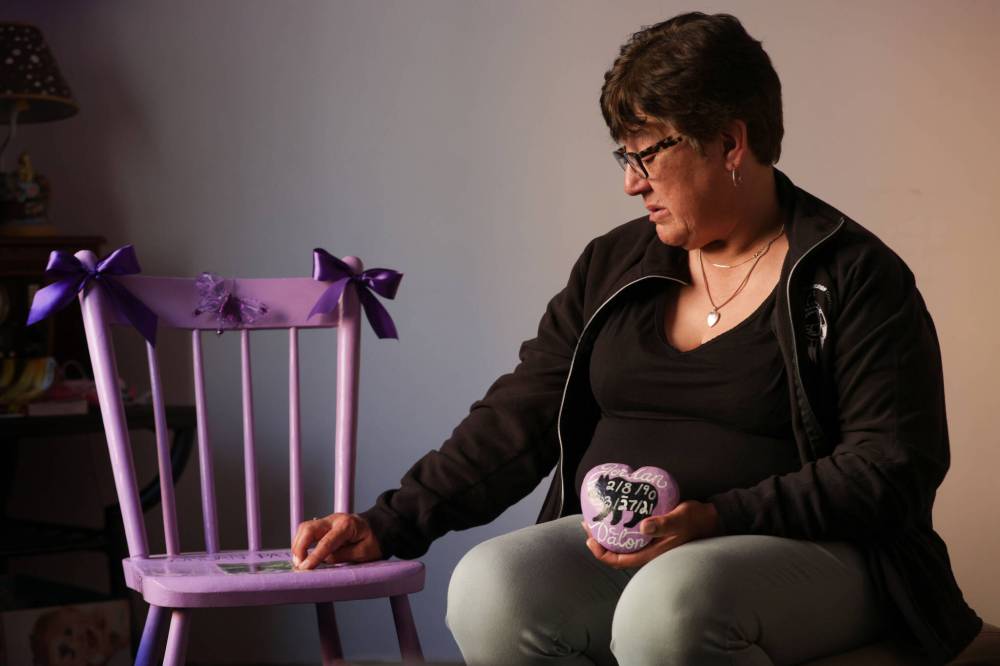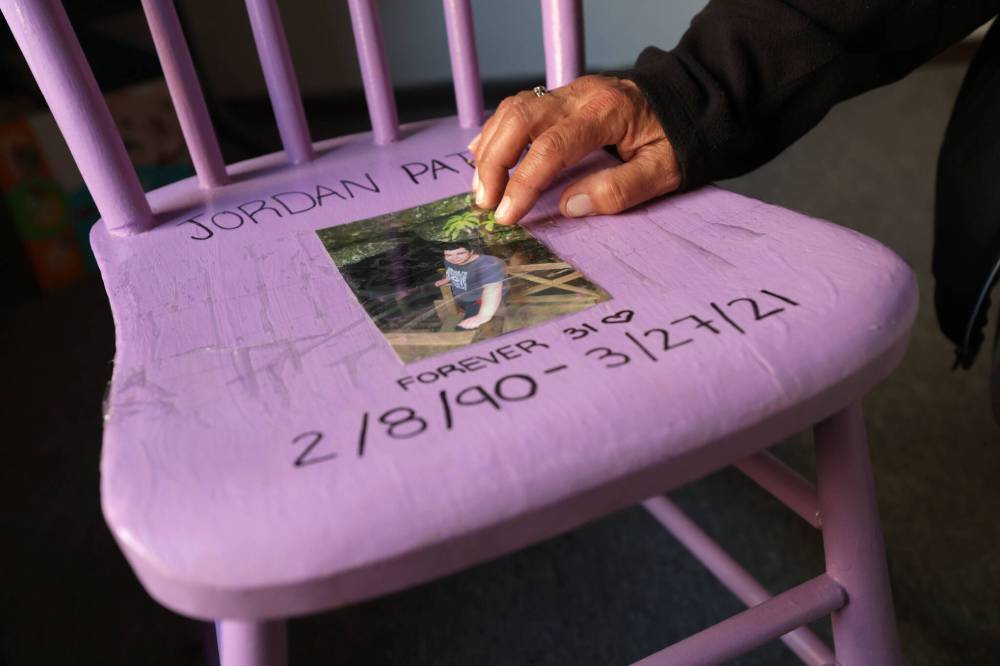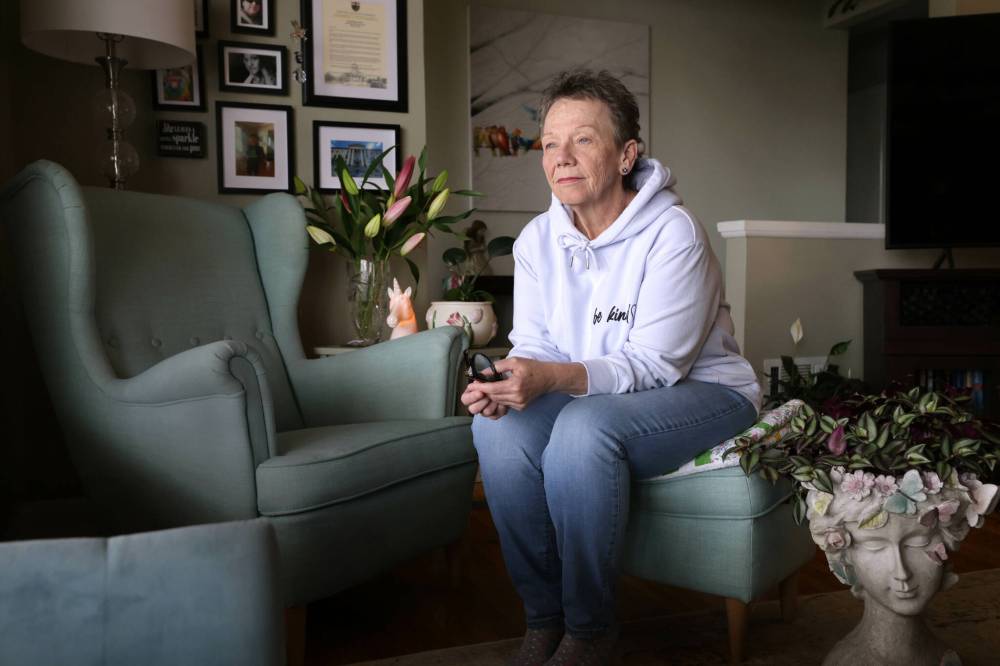A mother’s unending love United in grief, mothers of children lost to overdose push for awareness and action in face of toxic drug crisis
Read this article for free:
or
Already have an account? Log in here »
To continue reading, please subscribe:
Monthly Digital Subscription
$0 for the first 4 weeks*
- Enjoy unlimited reading on winnipegfreepress.com
- Read the E-Edition, our digital replica newspaper
- Access News Break, our award-winning app
- Play interactive puzzles
*No charge for 4 weeks then price increases to the regular rate of $19.00 plus GST every four weeks. Offer available to new and qualified returning subscribers only. Cancel any time.
Monthly Digital Subscription
$4.75/week*
- Enjoy unlimited reading on winnipegfreepress.com
- Read the E-Edition, our digital replica newspaper
- Access News Break, our award-winning app
- Play interactive puzzles
*Billed as $19 plus GST every four weeks. Cancel any time.
To continue reading, please subscribe:
Add Free Press access to your Brandon Sun subscription for only an additional
$1 for the first 4 weeks*
*Your next subscription payment will increase by $1.00 and you will be charged $16.99 plus GST for four weeks. After four weeks, your payment will increase to $23.99 plus GST every four weeks.
Read unlimited articles for free today:
or
Already have an account? Log in here »
Hey there, time traveller!
This article was published 12/05/2023 (941 days ago), so information in it may no longer be current.
Jordan. Phoebe. Devin.
Each was the centre of their mother’s world. Each struggled with addiction. Each is deeply missed.
For all three, their mothers are irreparably changed by the loss of their children to a drug overdose. The women are united in their unique grief, each battling against unwarranted stigma that’s wrapped around their loss and each desperate to keep their child’s memory alive.
Mother’s Day for them is difficult. Some would rather it pass by unmarked.
Perhaps the only gift they would ask for this year is to hear their child’s name and be given the chance to speak about them. It doesn’t happen nearly often enough.
This week, the Free Press sat down for emotional and wide-ranging conversations with three Winnipeg mothers who’ve lost children to drug overdoses. Each wanted a chance to spread awareness about toxic drugs and to encourage parents not to shy away from tackling tough subjects about mental health and substance use with their own kids.
But mostly, they wanted to talk about their children.
Gentle giant Jordan. Bubbly Phoebe. Quiet, loving Devin.
Here are their stories:
Barbara Mercredi, ‘Mumsy’ to Jordan Paton
Barbara Mercredi’s home is filled with memories of her son, Jordan. He’s in a photo tucked in her phone case, on a purple heart-shaped rock in her kitchen and on a living room wall she’s dedicated to his life.
But it’s her eyes that tell you how much she misses her son. They well up with tears when she talks about Jordan, her second-eldest child and first boy, who grew from a tough kid into a teddy bear of a man.
Jordan was 31 when he died of a drug overdose on March 27, 2021.
RUTH BONNEVILLE / WINNIPEG FREE PRESS Barbara Mercredi tries to hold back tears as she talks about losing her son, Jordan, to drug use. She holds a heart-shaped rock her family created as a memorial stone. 
Barbara wears his ashes in a heart-shaped locket around her neck. Her daughter, Stephanie, Jordan’s big sister, wears them in a necklace too.
“He was my heart,” Barbara says. “He was my son, but he was my friend.”
Jordan lived just two blocks over from his mom — “Mumsy” he called her. He loved to come over and just spend time with her, to chat and to eat the meals she’d cook for him. His friends teased him about being a mama’s boy, something he’d happily admit to.
As a kid, he was a “little monster,” Barbara says. “Really tough.” But as he grew up, he softened.
“He was just a good guy, he really was,” his mom says through tears.
A roofer by trade, Jordan was big and strong. He loved to help his family whenever they needed something moved or fixed.
“He was my heart. He was my son, but he was my friend.”–Barbara Mercredi
Stephanie, who joined her mom for the interview, remembers him immediately showing up at her house when she bought a stroller that needed putting together for her daughter, and the time he moved a heavy table for her with ease. Barbara jokes that he’d always be dripping in sweat by the end.
To Stephanie’s daughter, Jaelyn, Jordan was the fun uncle. She plays a video on her phone of the two goofing around, him spraying the youngster with water, her laughing hysterically. Jaelyn knows Jordan is gone, but she still asks for him sometimes. She calls him their angel.
When Stephanie started using drugs years ago, she says he’d get angry with her. She eventually stopped, but then — Stephanie makes a flip-flop motion with her hands — Jordan started using.
He tried methadone, a medication used to treat opioid addiction, they remember. But it didn’t stick.
Barbara says she hates drugs. She hates what happened to her family, and to others.
“Too many parents have lost kids,” she says.
RUTH BONNEVILLE / WINNIPEG FREE PRESS A special purple chair sits in Barbara Mercredi’s living room in honour of her son, Jordan. Purple is the colour for overdose awareness
Together, Stephanie and Barbara go to Overdose Awareness Manitoba events. They sometimes bring a purple chair with Jordan’s photo on it, or the heart-shaped rock with his name painted on. It’s good to be with others who understand what they’re going through.
This Mother’s Day, the family will go to Fisher River Cree Nation to visit Jordan’s gravesite, something they do on the day they lost him and on his birthday, having a feast in his honour. They also regularly visit a tree by the river near their house, a place where they feel connected to him. They’ll say a few words and leave a beer, tobacco and a plate of home-cooked food, or sometimes the Starbucks mango dragon-fruit lemonade refreshers he loved and a meal from Wendy’s.
His spirit name, given to him by an auntie, is Kind-Hearted Shining Black Bear.
“Thank you for listening to me,” Barbara says at the end of the visit. “I love talking about him. I always want to talk about him.”
Janis Gillam, ‘Mummy’ to Phoebe Wilson
Almost everything Janis Gillam does is for her daughter, Phoebe.
She is raising Phoebe’s son, Jaxon, who looks and acts just like his mom. She has baked thousands of cookies for strangers and people who cared for her daughter. She and her husband pick up countless donated clothes and kitchen items and anything else people might need, dropping it off at shelters and homeless encampments.
She advocates for a safer supply of drugs in Manitoba. She corrects ill-informed people commenting on social media about substance use disorder. She even makes situation-appropriate cards for mothers like her — “Wishing you a gentle bereaved Mother’s Day,” read recent ones.
This is what keeps Janis going.
“For a fleeting moment, my heart feels full,” she says. “It helps.”
RUTH BONNEVILLE / WINNIPEG FREE PRESS Janis Gillam lost her daughter Phoebe in 2020. She now cares for her grandson, which brings her joy and keeps her moving forward and hopeful.
Phoebe was the third of Janis’s five children. She was a bright and bubbly child who loved to make people feel special, especially those who might feel left out.
As an adult, she was an artist and a mom and an empath who scolded her own mom when she wouldn’t give money to people asking for it on the street.
“They’re going to spend it on drugs,” Janis would argue, to which her daughter would say: “Yes, but mummy, they’re going to do that anyways, and you giving them money means they have to do one less bad thing to get it.”
Janis was never ashamed of her daughter’s mental health or addiction struggles, which started in her late teens.
And it makes her furious to think of anyone judging her daughter — or her family — now.
“Yes, but mummy, they’re going to do that anyways, and you giving them money means they have to do one less bad thing to get it.”–Phoebe
“It’s everywhere,” she says of addiction.
Janis did everything she could to help her daughter. She subsidized her apartment and brought her groceries. When Phoebe would get kicked out of the apartment and sell the food, Janis would pay for the next apartment and bring prepared food instead.
She brought her to treatment centres and to meetings for substance use disorder. She did this all because she loved her daughter. Still, she feels guilt. And she is desperate to know if her daughter knew how much she loved her when she died.
Phoebe died of a fentanyl-related drug overdose on July 26, 2020. She was 31.
Later that same year, Janis’s stepson, Chris Read, also passed away from a fentanyl-related overdose. He was 37, a father, welder and artist who lived in British Columbia.
“We grieve and we grieve and we grieve,” Janis says, sitting on a sofa in her Winnipeg home.
“We grieve and we grieve and we grieve.”–Janis Gillam
She calls herself — and all moms who’ve lost children to drug overdoses — warriors. She wants to fight for her daughter, to make life better for anyone facing the same struggles she had.
When she completes a task she’s undertaken in Phoebe’s honour, she looks up — “I did this for you, Phoebe,” she says.
She loves saying her daughter’s name.
Sandra Ingram, ‘Mom’ to Devin Ramdoyal
Greeting visitors at Sandra Ingram’s front door is a black-and-white cat named Oliver who scurries off when she approaches. Oliver was her son Devin’s beloved cat and, like all things he loved and left behind, remains cherished by his family.
“It’s everything,” Sandra says of the last Mother’s Day card she received from Devin. It was a surprise, something small and sentimental he didn’t usually have the capacity to think about when his mental health struggles were taking hold.
Sitting on her back deck on a warm but overcast spring day, Sandra says the loss of her son feels like she forever has a backpack strapped to her body.
“It’s always there. Never goes away,” she says. “And sometimes that backpack is a little bit lighter and sometimes it’s very heavy.”
RUTH BONNEVILLE / WINNIPEG FREE PRESS Sandra Ingram at a small park on the property of St. Amant Centre where a tree was planted in honour of her son Devin for his volunteer work at the centre. Devin had mental health struggles as a young boy which later led him to using drugs that led to his death at a young age. 
She calls her son Devin her “miracle” child. He was her only child, a baby she and her husband had long wanted.
As a boy, Devin was quiet and shy. He was loving and affectionate.
“He’d say, ‘Love you mom.’ I’d say, ‘Love you more.’”
For a long time, Devin struggled with mental health. When he was around 10, he told his mom “my brain is broken.” As a young adult, he started hearing voices and was admitted to hospital for a psychotic episode. Later in life, he was diagnosed with schizophrenia. He started using marijuana and later, other drugs, something his mom now understands was a way of self-medicating. But even then, he racked up nearly 500 volunteer hours with St. Amant, working with people with disabilities. It was a role he thrived in, one that was later honoured by St. Amant with a tree in a quiet corner of the organization’s property near the river.
Sandra struggled to accept her son’s dual challenges of addiction and schizophrenia. She was scared and just wanted her son well again.
Now, she is matter-of-fact.
“Addiction is not a choice and severe mental illness is not a choice,” she says.
RUTH BONNEVILLE / WINNIPEG FREE PRESS Sandra Ingram with the last Mother's Day card she received from her son, Devin. 
She wants other parents to know it’s important to confront issues of mental health and addiction head on, with the right supports for families. Stigma should not lead to silence, especially when a child’s life could be at risk.
Sandra now leads a support group called Healing Hearts for people who’ve lost loved ones to the toxic drugs crisis.
“Only those people get it,” she says. “You see it in their eyes. You just feel you’re with your people.”
Spending time with the group helps her, she says.
She feels a bit lighter, and she senses they feel a bit lighter, just from being together.
katrina.clarke@freepress.mb.ca

Katrina Clarke
Investigative reporter
Katrina Clarke is an investigative reporter at the Winnipeg Free Press. Katrina holds a bachelor’s degree in politics from Queen’s University and a master’s degree in journalism from Western University. She has worked at newspapers across Canada, including the National Post and the Toronto Star. She joined the Free Press in 2022. Read more about Katrina.
Every piece of reporting Katrina produces is reviewed by an editing team before it is posted online or published in print — part of the Free Press‘s tradition, since 1872, of producing reliable independent journalism. Read more about Free Press’s history and mandate, and learn how our newsroom operates.
Our newsroom depends on a growing audience of readers to power our journalism. If you are not a paid reader, please consider becoming a subscriber.
Our newsroom depends on its audience of readers to power our journalism. Thank you for your support.










